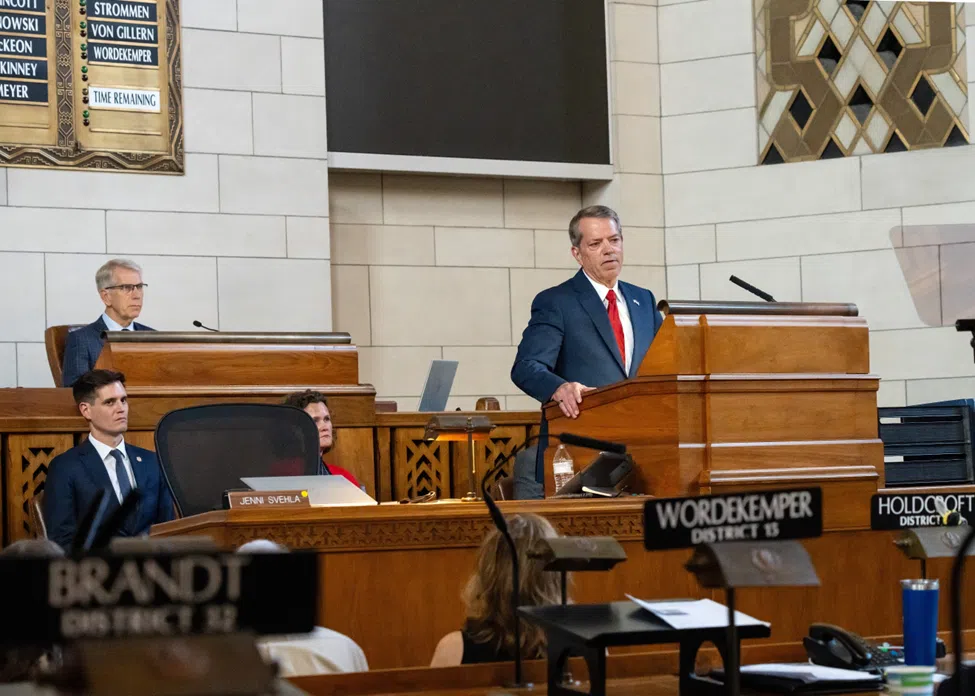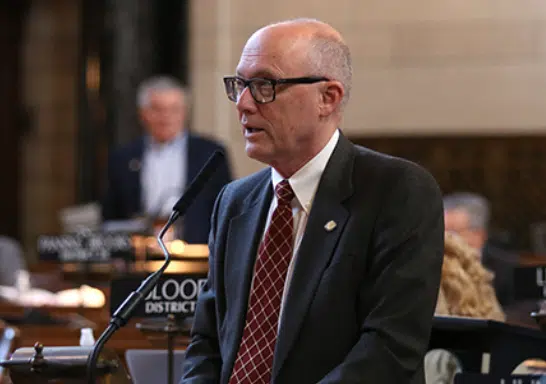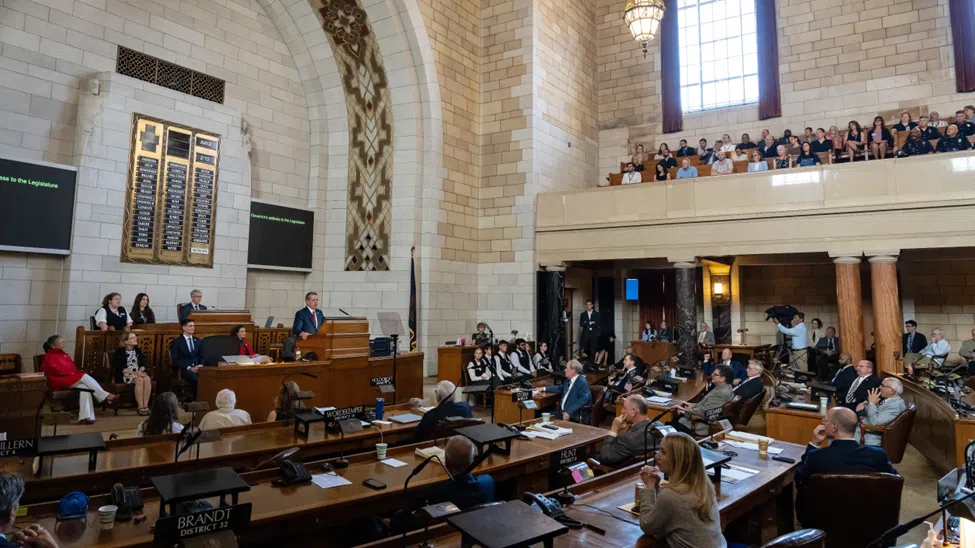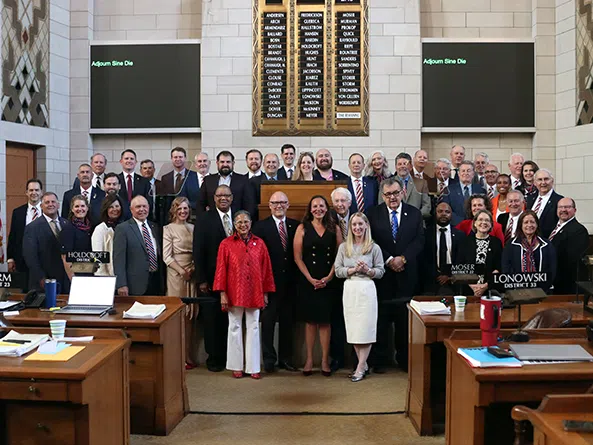Concluding the 90-day session for 2025, Nebraska Lawmakers adjourned the legislature “sine die” Monday early on day 89.
As is tradition, five senators are selected to escort in Governor Jim Pillen to deliver a sine die (Latin for “without a date” or until further notice) address. This year’s selected lawmakers were Rob Clements of Elmwood, Tom Brandt of Plymouth, John Fredrickson of Omaha, Jen Hughes of Seward, Jane Raybould of Lincoln, and Rita Sanders of Bellevue.
Pillen said in his farewell to lawmakers, “the headline for the first session of the 109th Nebraska Legislature is simple: Positive, lasting impact serves Nebraskans well,” followed by an outline of his major legislative wins.
He commended lawmakers for passing the state’s $11 billion two-year budget which he characterized as “a balanced, historically conservative budget package,” which “puts idle pillowcase money to work, and invested in education, property tax relief, and the safety of our state.”
The achievement by lawmakers is notable, as they began the session staring down a reported $432 million deficit. Although, some in the body disputed the budget’s characterization as “balanced,” saying, “We’re just making it look like it’s balanced.”

Gov. Pillen delivers his 2025 “sine die” address to the 109th Legislature. (Photo: Office of Governor Jim Pillen)
Pillen praised the passage of his series of bills aimed at restricting social media for youth, “giving parents more of an opportunity to fight back against big tech’s grip on our kids.” Those bills—LB140, LB383, and LB172—restrict cell phone use in schools, expand parental controls on social media, and prohibit AI-generated child pornography.
The passage of LB246, Pillen said, would “defend the legacy and future of Nebraska agriculture” by banning the production, sale, and promotion of lab-grown or “fake” meat in the state. Also sure to impact the state’s agriculture market, Pillen said the focus of the newly created Department of Water, Energy and Environment—born through LB 317, which combined the Departments of Natural Resources and Environment and Energy—will be water quantity and water quality.
“It has to be,” said Pillen.
More controversially, Pillen applauded the passage of LB 644, known officially as the “Foreign Adversary and Terrorist Agent Registration Act” but panned by opponents as the latest “McCarthyist Red Scare law.” The bill requires people engaging in political activities for, consulting, raising or spending money, or representing those deemed “adversary nations” to register with the Nebraska Attorney General and describe their activities, or face fines up to $50,000. The nations covered include China, Cuba, Iran, North Korea, Russia, and the Maduro regime in Venezuela. Businesses would also need to attest to their compliance during biannual reports.
Pillen’s other highly controversial proposal, LB 89, also received a mention, described as “taking a stand to ensure a level playing field and a fair shot for all of Nebraska’s young female athletes.”
The bill, known as the “Stand with Women Act,” restricts transgender participation in K-12 and college sports to a student’s “sex” which is now defined in state law by reproductive anatomy. Supporters like Pillen say the new law is a protective measure, while opponents say it is discriminatory and unnecessary due to obscurity of transgender athletes, especially in youth sports.
“We made real progress that will make practical improvements in the lives of Nebraskans,” said Pillen. “Good news… in just seven or so months, we all get to do it over again. There will be new problems to solve and old ones too. We have to do more with less and spend less serving Nebraskans.
We can decrease spending and actually fix our tax system and we have to fix it because it is badly broken.”
Speaker of the Legislature Jon Arch of La Vista also offered a forecast for the next session in his closing remarks, following the Governor.
He offered a sort of 2025 Nebraska Legislature Wrapped, detailing the amount of bills and motions juggled in the unique one-house political body.

Speaker of the Legislature Jon Arch of La Vista (Photo Courtesy: Nebraska Unicameral Information Office)
This year:
- 736 bills and resolutions were introduced.
- 726 hearings were held (due to the withdraw of 10 proposals early in the session).
- 209 bills were signed into law by the Governor + 1 constitutional amendment by the Secretary of State (giving voters the opportunity to extend term limits to three terms in 2026).
- 113 bills were amended into signed bills, bringing that effective total to 322 bills.
- 106 bills were designated as “priority” bills.
- 98 of those priority bills were debated in “one forum or another.”
- 67 priority bills were ultimately passed.
“But we also come to the end of the session with mixed emotions. Grateful for the work accomplished, but disappointed we couldn’t do more,” said Arch. “But that is the motivation to return in January and pick up the work where we left off.”
This session saw its share of growing pains, as about ⅓ of the body’s 49-senators were freshman at the start of the session. Speaking with KLIN News before the session, Arch predicted in January that the budget would be the most consequential bill this year. However, a theme of party-line tweaks to voter-approved ballot measures may define the work of Nebraska’s technically nonpartisan lawmakers this year.
Lawmakers passed LB 415, which removes certain workers from qualifying for the paid sick-leave measure. As a result, employers are not required to offer paid sick-leave to teens ages 14-15, temporary workers, seasonal agricultural workers, and workers at small businesses with 10 or fewer employees. Sen. Jane Raybould of Lincoln broke from fellow Democrats in the body to support the bill. The original ballot measure received an overwhelming 74.56% approval from voters on the November 2024 ballot.
An effort from those Dems, however, did stall a bill from Raybould aiming to slow down the state’s growing minimum wage. Approved by over 58% of voters on the 2022 ballot, the minimum wage has climbed $1.50 each year, set to reach $15 in 2026. From there, the state’s minimum wage is set to adjust each year based on the Consumer Price Index for All Urban Consumers (CPI-U) for the Midwest Region. Or put simply: adjusted to the cost of living.
Raybould failed to amend her proposal to cap the cost-of-living adjustments to the paid sick-leave bill. Her bill, or something similar, is likely to come up again next year.
Lastly, lawmakers fumbled a bill to establish the regulatory framework for the state’s newly legalized medical marijuana industry. The purview of regulations now rests in the hands of the newly established Nebraska Medical Cannabis Commission. Board appointees, put forth by Gov. Pillen, who opposed legalization, have proved controversial. Long time advocates worry new members could delay or derail the rollout of the ~71% voter-approved medicine.
“I will predict that our biggest challenge next year will be our budget once again,” said Arch. “We sent a balanced budget to the governor, but we always face mid-biennium budget adjustments, and next year will be no different, and in fact could be more challenging… There is considerable uncertainty in the world that could make accurately predicting our fiscal future more difficult. This uncertainty should be in your mind as you think about bills for next session. Keep our budget in mind. Pay attention to what is happening in D.C. and the impact any action there can have on state funds.”
The final legislative day ended with a round of applause for the Unicameral’s supporting staff, including the Clerk of the Legislature Brandon Metzler and employees within his office, legislative pages, transcribers, the Sergeant at Arms, among others.
Lt. Gov. Joe Kelly adjourned the body “sine die” at 2:45 p.m.
Senators will return to Lincoln and reconvene Jan. 7, 2026, for a 60-day legislative session.









